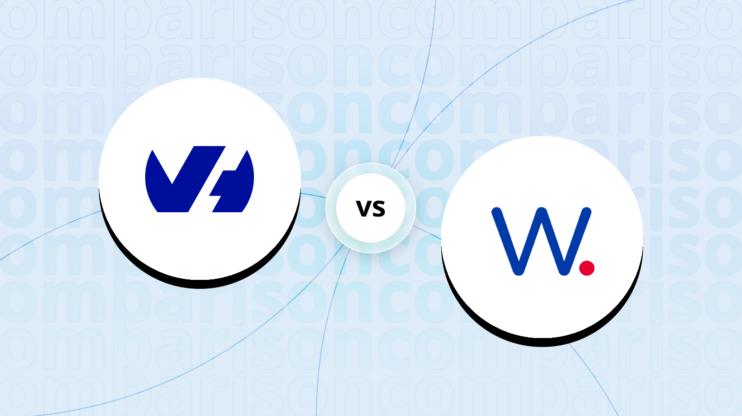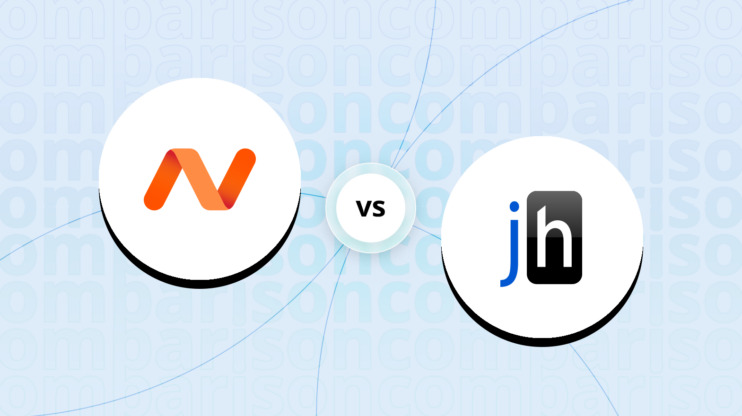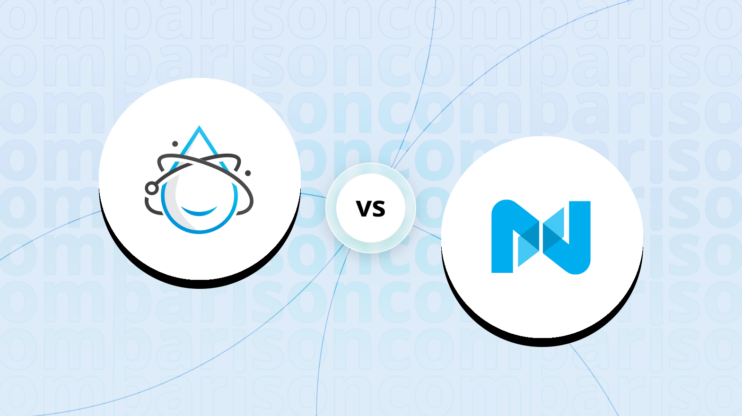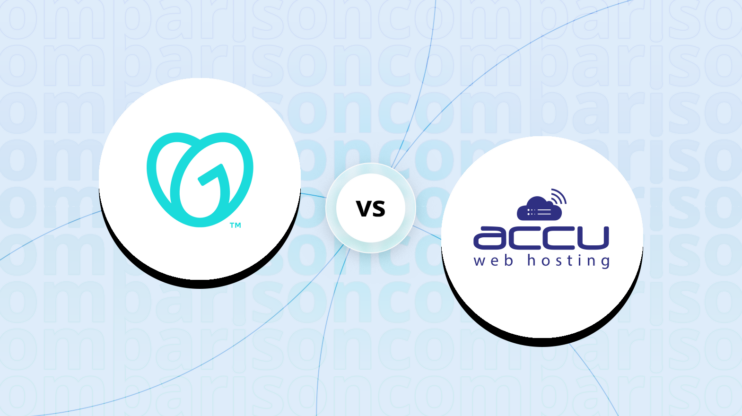Namecheap vs Hawk Host: Final verdict
Looking over Namecheap vs. Hawk Host, both are strong contenders for different user needs.
-
Hawk Host (Overall grade: 8.4)
excels in performance, featuring six global data centers, enterprise-grade servers, and a 99.9% uptime guarantee. The platform’s integration with Cloudflare, proactive malware scanning, and utilization of LiteSpeed Web Server result in superior speed and reliability. Customers appreciate its robust support system, versatile customer service options, and flexible cloud hosting plans. However, the lack of dedicated hosting may limit certain high-demand applications.
Namecheap (Overall grade: 7.2)
offers competitive plans with a broad range of features like free SSL certificates for the first year and unmetered bandwidth. It boasts a 100% uptime guarantee for shared, business, and dedicated accounts, though actual performance has shown minor uptime shortcomings. It is particularly strong in providing comprehensive SSL options and various additional security features, and its user-friendly site migration tools make it favorable for beginners and startups. Nevertheless, Namecheap falls behind Hawk Host in overall speed and scalability, putting it at a slight disadvantage for high-performance needs.
 Overall grade:7.2 |
 Overall grade:8.4 |
|
|---|---|---|
| Uptime and Availability | 8.0 | 9.0 |
| Hosting Performance | 8.2 | 8.9 |
| Hosting Security | 8.5 | 8.5 |
| Price | 8.7 | 8.7 |
| Hosting Features | 7.5 | 6.7 |
| Ease Of Setup | 8.8 | 9.0 |
| User Management | 0.0 | 8.1 |
| Customer Support | 8.0 | 8.6 |
| User feedback | 4.3/5 | 5/5 |
Hosting types offered
Both platforms provide a variety of hosting types, each designed to meet the different needs of users.
 |
 |
|
|---|---|---|
| Shared hosting | ||
| Cloud hosting | ||
| WordPress hosting | ||
| Ecommerce hosting | ||
| VPS hosting | ||
| Dedicated hosting |
Although both offer a variety of hosting plans tailored to different needs, in
certain cases, one platform may prove to be more suitable.
Detailed comparison
Uptime and availability
Evaluates the average uptime statistics, uptime guarantee and overall availability of the hosting
provider
Score Components:
- Uptime percentage (30%): evaluates the uptime statistics in given period of time
- Uptime guarantee (20%): Assesses if the platform offers an uptime guarantee and
whether the actual uptime matches the promised guarantee. - General performance (25%): Evaluates how fast is the average response time and overall
it’s stability. - Responsiveness (10%): Adaptability to different devices and screen sizes.
- Availability (25%): Reflects the total downtime and number of outages.
 8.0
8.0
 9.0
9.0
🏆 Winner
Hawk Host: It’s superior uptime and significantly faster response times make Hawk Host a better choice for users who require high performance and stability from their hosting provider.

Hawk Host shows a slightly superior performance in terms of reliability and speed. Both hosting services have impressive uptimes, with Hawk Host slightly edging out Namecheap with a 99.99% uptime over a 3-month period compared to Namecheap’s 99.89%. This difference in uptime is reflected in the number and duration of outages, where Hawk Host experienced 3 outages totaling 12 minutes, while Namecheap had 5 outages totaling 2h 12 minutes.

Hawk Host’s advantage is more pronounced in terms of server response time. It boasted an average response time of 389ms, which is significantly lower than the shared hosting industry standard and faster than Namecheap’s average response time of 670ms, which can peak up to 1152ms. This suggests that Hawk Host is not only more reliable in maintaining uptime but also in delivering faster website loading speeds, making it a preferable option for users prioritizing performance.
Which one has better hosting performance?
Score Components:
- Hosting speed (30%): This includes SSD quality, Load times, PageSpeed score ranges,
additional information on website speed, built-in plugins for performance enhancement, available caching
methods, and CPU/RAM options - CDN (20%): Considers whether CDN is available or not, whether it’s free or paid, and
the quality of the CDN service - Available data centers (30%): Evaluates the number of data centers and their locations
globally. - Scalibility (20%): Looks at whether elastic scaling is available, the process required
to scale (manual upgrade vs. automatic scaling), the presence of dedicated servers, and the costs
associated with scaling.
 8.2
8.2
 8.9
8.9
🏆 Winner
Hawk Host: Offers advanced performance with top-tier hardware and comprehensive security features.
When comparing the general performance of Namecheap and Hawk Host, both providers offer SSD storage for faster website loading times, but Hawk Host edges out with high-performance NVMe storage for reduced latency. Namecheap’s WordPress hosting shows notable speed with a fully loaded time of 0.7 seconds, whereas Hawk Host utilizes LiteSpeed Web Server for speed boosts and optimization. Hawk Host leverages CloudFlare for free CDN integration, enhancing load times and security, whereas Namecheap includes a free CDN with WordPress plans. Namecheap has data centers in the US, UK, and EU, with the EU center powered by renewable sources, while Hawk Host covers more global locations including the US, Netherlands, Hong Kong, and more.
Website Speed
Namecheap’s WordPress hosting boasts excellent speed with a fully loaded time of 0.7 seconds and a 192ms time to first byte. It offers a 3x speed increase compared to traditional hosting. Hawk Host, benefiting from LiteSpeed Web Server, ensures rapid page loading and better resource handling. The 40Gbps server connectivity also contributes to Hawk Host’s quick data transfer, leading to snappier website experiences.
Scalability
Namecheap and Hawk Host both offer scalable hosting solutions, but the specific approaches are different. Namecheap provides straightforward plan upgrades across different hosting types, with clear tiers for shared, WordPress, and VPS hosting. However, the exact mechanism of elastic scaling isn’t outlined. Hawk Host offers Cloud Compute starting at $5.00/mo, with a system that appears to allow for flexible upgrades, but it’s unclear if scaling is automatic or manual. Dedicated servers were not mentioned for either service.
Which one has better security features?
and regulatory requirements
Score Components:
- Technical security measures (40%): This includes encryption, firewalls, DDoS
protection, secure configurations, server monitoring, access control and availability of security addons
(e.g Sitelock security). - Operational security measures (30%): Encompasses data privacy, backups and data
redundancy. - Compliance and certifications (20%): Adherence to legal and regulatory requirements
(e.g., GDPR, HIPAA) and possession of certifications (e.g., ISO 27001, SOC 2). - Business and reliability (10%): Factors in the provider’s reputation, uptime
guarantees, and customer support.
 8.5
8.5
 8.5
8.5
🏆 Winner Namecheap: Offers a broad range of SSL certificates and extensive security measures.
Both Namecheap and Hawk Host, have notable differences in their approaches to technical and operational
security, as well as in their compliance with regulations.
Technical security measures:
Namecheap provides various SSL certificates catering to different needs, including Domain Validation (DV), Organization Validation (OV), and Extended Validation (EV), whereas Hawk Host’s options are AlphaSSL, DomainSSL, Organization SSL, and ExtendedSSL. Namecheap supports PHP versions from 5.x to 8.x, giving flexibility in script compatibility. Both providers offer essential security add-ons like SSH access, but Namecheap includes advanced features such as IP Deny Manager, Leech Protect, and Virus Scanner. Hawk Host focuses on proactive malware scanning and DDoS protection, ensuring server-level security.
Operational security measures:
Both Namecheap and Hawk Host offer Two-Factor Authentication (2FA) and frequent backups. Namecheap adds value with features like domain privacy, PremiumDNS, FastVPN, and spam protection solutions like Jellyfish Spam Protection and BoxTrapper. Hawk Host, although providing comprehensive daily backups and DDoS protection by default, emphasizes enterprise-grade hardware and offers Cloudflare integration for enhanced DNS management. Both providers maintain 24/7 customer support, ensuring rapid response times to security issues.
Compliance and certifications:
Namecheap and Hawk Host have measures in place to comply with GDPR. Namecheap covers various GDPR rights, including data portability and the right to be forgotten. Hawk Host is updating its internal policies and software to align with GDPR requirements. Neither provider specifies HIPAA compliance. PCI compliance isn’t explicitly stated, but both offer SSL certificates, aiding in meeting some PCI security standards.
 |
 |
|
|---|---|---|
SSL certificate |
Extensive |
Limited |
Additional security features |
Extensive |
Limited |
PHP versions |
5.x to 8.x |
Not specified |
GDPR compliance |
Specified |
Specified |
HIPAA compliance |
Not specified |
Not specified |
PCI compliance |
Not specified |
Not specified |
Hosting features
Score Components:
- Domains (20%): Assesses the availability of a free domain, domain purchase options, and
pricing - Email (15%): Considers if the provider offers full email hosting, or is reselling
third-party service, and if the email is only transactional or not - Website builder (15%): Checks if website builder is available, and it’s user
friendliness and overall the level of customization allowed. - Staging environment (20%): Determines if a staging environment is available, allowing
for testing changes before going live. - FTP & SFTP accounts (10%): Evaluates if and how easily users can access FTP and
SFTP accounts - Git and SSH access (20%): Assess whether Git is integrated into the hosting service and
if SSH access is provided
 7.5
7.5
 6.7
6.7
🏆 Winner
Namecheap: Reliable hosting service with extensive features and flexible plans.
When choosing between Namecheap and Hawk Host, both hosting providers offer a variety of benefits to different types of users. Namecheap provides a stellar website builder across all its shared hosting plans, which is user-friendly and allows for complex customizations. This advantage makes it an appealing choice for users looking to build and manage multiple websites seamlessly. Additionally, Namecheap includes free services like SSL Certificates for the first year, making it a cost-effective solution for startups. On the other hand, Hawk Host incorporates CloudFlare optimization and proactive malware scanning, enhancing website security and loading speeds. This level of security might attract users requiring robust website protection without additional fees.
In terms of email hosting, Namecheap offers a personalized domain-based email service with features like Jellyfish Spam Protection and unlimited email mailboxes in its higher-tier plans. Hawk Host matches well with unlimited email accounts and enterprise-level spam filtering via SpamExperts. Namecheap also stands out with its cloud storage feature and auto-backup options, particularly with the Stellar Business plan. Meanwhile, Hawk Host provides daily backups and extensive application support with one-click installations for over 380 apps, including WordPress, ensuring ease of setup and maintenance. Both providers offer a 30-day money-back guarantee, allowing users to evaluate their services without significant upfront commitment.
 |
 |
|
|---|---|---|
Free domain |
No |
No |
Free SSL |
Yes, for the first year |
Yes, with Let’s Encrypt |
Email hosting |
Yes |
Yes |
Website builder |
Yes |
No |
Staging environment |
No |
No |
FTP & SFTP accounts |
Yes, included with SSH |
Yes, included with SSH |
Git and SSH access |
Yes |
Yes |
Free backup |
Yes, with higher plans |
Yes, daily backups |
Money back guarantee |
Yes |
Yes |
a location.
As a result in rare cases the features mentioned here can differ from the ones you see on their websites.
Both providers support a range of users from beginners to experts with user-friendly website builders and WordPress staging areas. However, in terms of developer tools, both Namecheap and Hawk Host offer robust options including SSH access, support for multiple programming languages, and Git for version control, thus appealing to developers looking for advanced capabilities.
Email services:
Namecheap provides users with domain-based email accounts starting from 30 mailboxes and increasing to unlimited in higher plans. It also includes features like spam protection and email forwarding. Hawk Host offers unlimited email accounts across all plans with enterprise-level spam filtering. While Namecheap’s email hosting is comprehensive, Hawk Host’s offering is equally robust, with minimal additional management required. Both providers do not resell third-party services but focus on their in-house email capabilities.
Price
Score Components:
- Plan value (40%): What each pricing tier offers.
- Transparency and clarity (30%): Clearness of pricing structures.
- Flexibility of plans (20%): Range of options to suit different budgets.
- Hidden costs (10%): Additional expenses not included in the plan.
 8.7
8.7
 8.7
8.7
🏆 Winner: Namecheap: Namecheap: Offering affordable plans and comprehensive features for various hosting needs.
Evaluating the pricing of plans among various hosting providers can be complex due to their differing pricing and renewal strategies. Additionally, certain plans require annual commitments, which adds to the difficulty of making comparisons. The prices listed are based on monthly commitments; plans requiring annual commitments are indicated. Additionally, although some providers offer identical plans for WordPress and shared hosting, we have created separate tables for each to enhance clarity.
Namecheap and Hawk Host offer competitive hosting plans for different needs. Namecheap’s shared hosting plans range from $1.98 to $4.98 per month annually, with features like free SSL, Supersonic CDN, and website migration. Hawk Host’s shared hosting starts at $2.24 per month with unlimited bandwidth and proactive malware scanning. Namecheap’s WordPress plans range from $2.91 for EasyWP Starter to $5.74 for EasyWP Supersonic, boasting features such as 50 GB SSD storage and faster speeds. Hawk Host’s WordPress plans start at $2.24 per month, including free Redis and Memcached servers. For cloud hosting, Hawk Host starts at $5 per month, while Namecheap’s dedicated servers kick off at $44.88. Each provider has unique offerings tailored for different user needs.
 |
 |
|---|---|
|
EasyWP Starter $6.88
1 Website, 10 GB SSD storage, 50k visitors/month, Free CDN, Free SSL, Easy backups and restores, 99.9% Uptime Value for price:8.5
|
Primary Plan $3.74
Unlimited Websites, 10,000MB SSD, Unlimited Bandwidth, Free Memcached Server, Free Redis Server, Proactive Malware Scanning, Daily Backups Value for price:8.7
|
|
EasyWP Turbo $12.88
1 Website, 50 GB SSD storage, 200k visitors/month, 1.5x more CPU, 1.5x more RAM, Free CDN, Free SSL, Easy backups and restores, 99.9% Uptime Value for price:8.9
|
Professional Plan $7.49
Unlimited Websites, Unlimited SSD, Unlimited Bandwidth, Free Memcached Server, Free Redis Server, Proactive Malware Scanning, Daily Backups Value for price:8.8
|
|
EasyWP Supersonic $19.88
1 Website, 100 GB SSD storage, 500k visitors/month, 2x more CPU, 2x more RAM, Free SSL, Free CDN, Easy backups and restores, 99.99% Uptime Value for price:9.2
|
Professional+ Plan $11.99
Unlimited Websites, Unlimited SSD, Unlimited Bandwidth, Free Memcached Server, Free Redis Server, Proactive Malware Scanning, Daily Backups Value for price:9.0
|
 |
 |
|---|---|
|
Stellar $4.48
3 Websites, 20 GB SSD, Unmetered Bandwidth, 30 Mailboxes, Free domain name for the first year, Free SSL installation, Free Supersonic CDN, Auto SSL, Website migration in <24 hours Value for price:9.0
|
Primary Plan $3.74
Unlimited Websites, 10,000MB SSD, Unlimited Bandwidth, Unlimited Email Accounts, Free SSL, Proactive Malware Scanning, Daily Backups Value for price:8.7
|
|
Stellar Plus $6.48
Unlimited Websites, Unmetered SSD, Unlimited Mailboxes, Website Builder, Free domain name for the first year, Free SSL installation, Free Supersonic CDN, AutoBackup, Website migration in <24 hours Value for price:9.3
|
Professional Plan $7.49
Unlimited Websites, Unlimited SSD, Unlimited Bandwidth, Unlimited Email Accounts, Free SSL, Proactive Malware Scanning, Daily Backups Value for price:8.8
|
|
Stellar Business $9.48
Unlimited Websites, 50 GB SSD, Unlimited Mailboxes, AutoBackup & Cloud Storage, Website Builder, Free domain name for the first year, Free SSL installation, Free Supersonic CDN, Website migration in <24 hours Value for price:9.5
|
Professional+ Plan $11.99
Unlimited Websites, Unlimited SSD, Unlimited Bandwidth, Unlimited Email Accounts, Free SSL, Proactive Malware Scanning, Daily Backups Value for price:9.0
|
 |
 |
|---|---|
| N/A |
1 GB Plan $5
1 Website, 30 GB SSD, 2 TB Bandwidth, 1 GB RAM, 1 CPU core, Full Root Access Value for price:8.5
|
| N/A |
2 GB Plan $10
1 Website, 55 GB SSD, 4 TB Bandwidth, 2 GB RAM, 1 CPU core, Full Root Access Value for price:8.6
|
| N/A |
4 GB Plan $20
1 Website, 85 GB SSD, 5 TB Bandwidth, 4 GB RAM, 2 CPU core, Full Root Access Value for price:8.6
|
| N/A |
8 GB Plan $40
1 Website, 165 GB SSD, 6 TB Bandwidth, 8 GB RAM, 4 CPU cores, Full Root Access Value for price:8.7
|
| N/A |
16 GB Plan $80
1 Website, 325 GB SSD, 8 TB Bandwidth, 16 GB RAM, 6 CPU cores, Full Root Access Value for price:9.0
|
| N/A |
32 GB Plan $160
1 Website, 650 GB SSD, 16 TB Bandwidth, 32 GB RAM, 8 CPU cores, Full Root Access Value for price:9.0
|
As a result in rare cases the prices displayed here can differ from the ones you see on their websites.
Enterprise plans
Namecheap’s advanced dedicated server options provide a variety of customizable configurations suitable for high-traffic websites and data-intensive applications, starting at $44.88 per month. These plans include 24/7 support and substantial backup storage. Hawk Host offers a range of VPS and Cloud Compute Hosting plans from $5 to $160 per month, with features like full root access and high SSD disk space, making it suitable for enterprise-level tasks and applications.
Namecheap vs Hawk Host: Ease of setup
platform.
Score Components:
- Site migration (25%): Assesses whether the provider offers tools for site migration,
either automated or manual, and whether these services are free or require a fee. - Admin panel usability (35%): Evaluates the type of admin panel provided, such as the
standard cPanel or a custom solution, focusing on its accessibility and user-friendliness for both
technical and non-technical users. - Setup features (20%): Examines the availability and ease of use of various setup
features, including FTP accounts, file managers, email account setup, PHPMyAdmin, and easy CDN
configuration. - Help center quality (20%): Measures the quality and accessibility of the provider’s
help center resources, including articles and tutorials.
 8.8
8.8
 9.0
9.0
🏆 Winner
Hawk Host: Reliable and user-friendly, Hawk Host stands out with its superior setup and support features.
Namecheap and Hawk Host both provide notable solutions for admin panel management, but they take different approaches to ensure user accessibility. Namecheap offers the EasyWP dashboard for its EaseWP plans, a custom-built interface that simplifies website management without cPanel complexity. Users can manage domains, backups, and other aspects via this intuitive dashboard. For other plans, Namecheap uses cPanel, providing a traditional yet straightforward experience suitable for both beginners and seasoned webmasters.
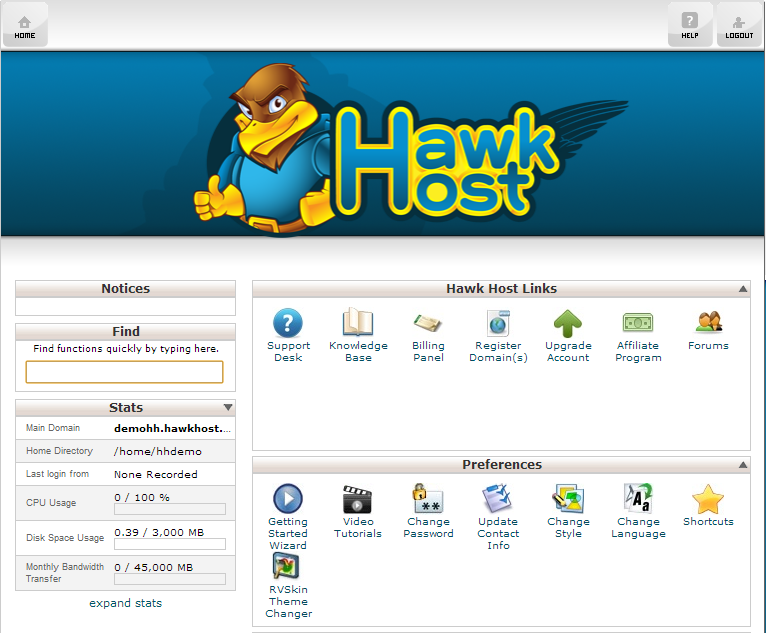
Hawk Host, on the other hand, sticks with the classic cPanel control panel for ease of use. cPanel’s widespread familiarity ensures that even those switching from other cPanel-based providers will find it straightforward. It integrates advanced features such as one-click installers and daily backups, making it user-friendly for both technical and non-technical users. Hawk Host also offers additional integrated services like CloudFlare optimization and free SSL certificates, enhancing overall ease of setup and management.
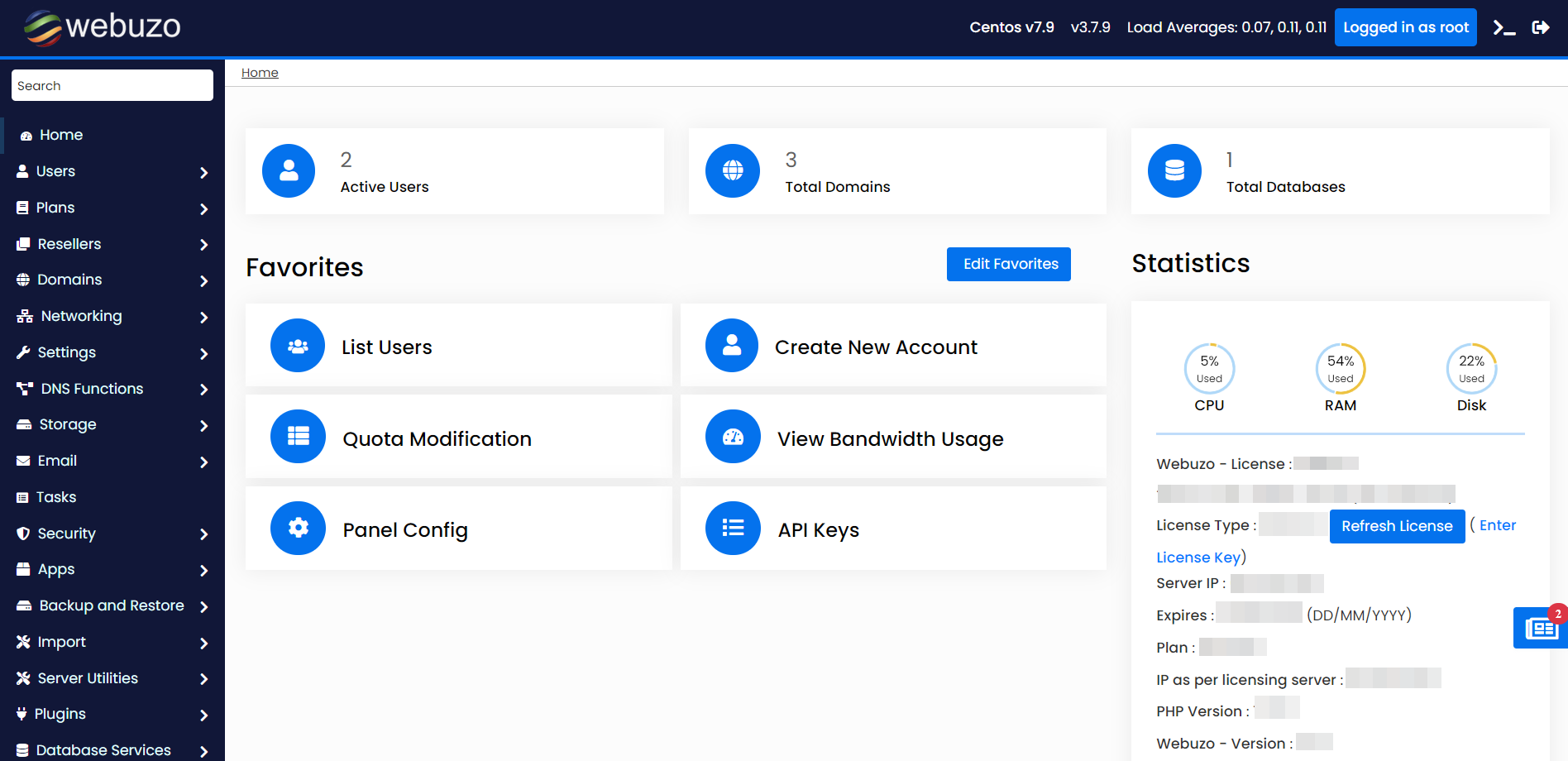
Regarding site migration, both Namecheap and Hawk Host provide comprehensive migration tools. Namecheap offers free migration services using the All-in-One WP Migration plugin, allowing seamless transfers from other providers such as GoDaddy and Bluehost. This service is available for a range of hosting plans, making it a convenient choice for many. Hawk Host similarly offers free migration services and can handle the transfer of accounts from other cPanel-based providers, ensuring minimal downtime and a hassle-free transition.
Both hosting providers excel in their support and resources, making help easily accessible. Namecheap offers 24/7 live chat and a support ticket system, backed by an extensive Knowledgebase covering various topics. Hawk Host also provides 24/7/365 support with multiple channels including live chat, email, and even Twitter. Their Knowledgebase is comprehensive, ensuring users can find solutions conveniently.
The platforms provide extensive knowledge bases filled with guides, how-to articles, and instructional content. Namecheap offers a wide range of resources alongside 24/7 chat and phone support. Hawk Host also boasts a detailed help center with an intuitive search function and around-the-clock support via live chat, phone, and ticketing, ensuring comprehensive user support.
User management
accessibility.
Score Components:
- Role customization (40%): Flexibility in creating and defining user roles and
permissions. - Ease of management (30%): User interface and tools for managing users.
- Access control (20%): Effectiveness of access control measures for different user
levels. - Scalability (10%): Ability to manage a growing number of users efficiently.
 0.0
0.0
 8.1
8.1
Winner Hawk Host: Hawk Host offers a structured user management system that surpasses Namecheap’s capabilities.
Hawk Host excels in managing user roles and permissions through a dedicated “User Management” page, allowing the main account owner to invite new users and assign specific permissions easily. This flexibility is essential for accounts that require multiple levels of access and control. Conversely, Namecheap’s lack of user management details suggests limited capabilities in this area. While Hawk Host enables granular control by letting the primary user select “All Permissions” or choose specific permissions for new users, Namecheap’s absence of information hints at a one-size-fits-all approach, if any user management features exist at all.
Hawk Host’s user interface is straightforward, with clear navigational elements such as the option to access “User Management” from the top-right menu. The “Invite New User” form is direct and easy to use, allowing new users to join via a registration URL sent through email. This method streamlines the process of adding users and adjusting their permissions. Namecheap’s interface, due to the lack of provided information, remains unknown, leading to assumptions of inadequacy or complexities that could hinder user management tasks.
In terms of access control measures and scalability, Hawk Host offers efficient mechanisms for managing permissions and adding users to an account, making it a reliable choice for businesses anticipating growth. The “Choose Permissions” option enhances security by ensuring users have only the access they need. Without detailed information on Namecheap’s user management system, one can infer potential challenges or limitations in handling growing user bases effectively, thereby impacting its scalability and control measures.
Hawk Host User Roles Table:
| Role | Description | Access Highlights |
|---|---|---|
| Primary Owner | Main account holder | Full access to all account settings and functionalities |
| Authorized User | Invited user with assigned permissions | Customized access based on permissions set by the primary owner |
Customer support
hosting provider.
Score Components:
- Support communication channels (30%): Measures the variety of customer support types
provided (live chat, chatbot, email, phone, etc.) - Availability (20%): Assesses the availability hours for each channel, including 24/7
support options. - Technical support quality (30%): Assesses whether the provider offers comprehensive
technical support, including hardware upgrades (e.g., HDD to SSD), software installations, and web
server configuration changes. - Enterprise support (20%): Checks if there are dedicated or priority support services
for enterprise-level customers.
 8.0
8.0
 8.6
8.6
🏆 Winner Hawk Host: Offering a broad range of support channels, including telephone support and an active community forum.
 |
 |
|
|---|---|---|
Phone support |
||
Live chat support |
||
Chatbot |
||
Email/ticket support |
||
Enterprise support (dedicated agent, priority support) |
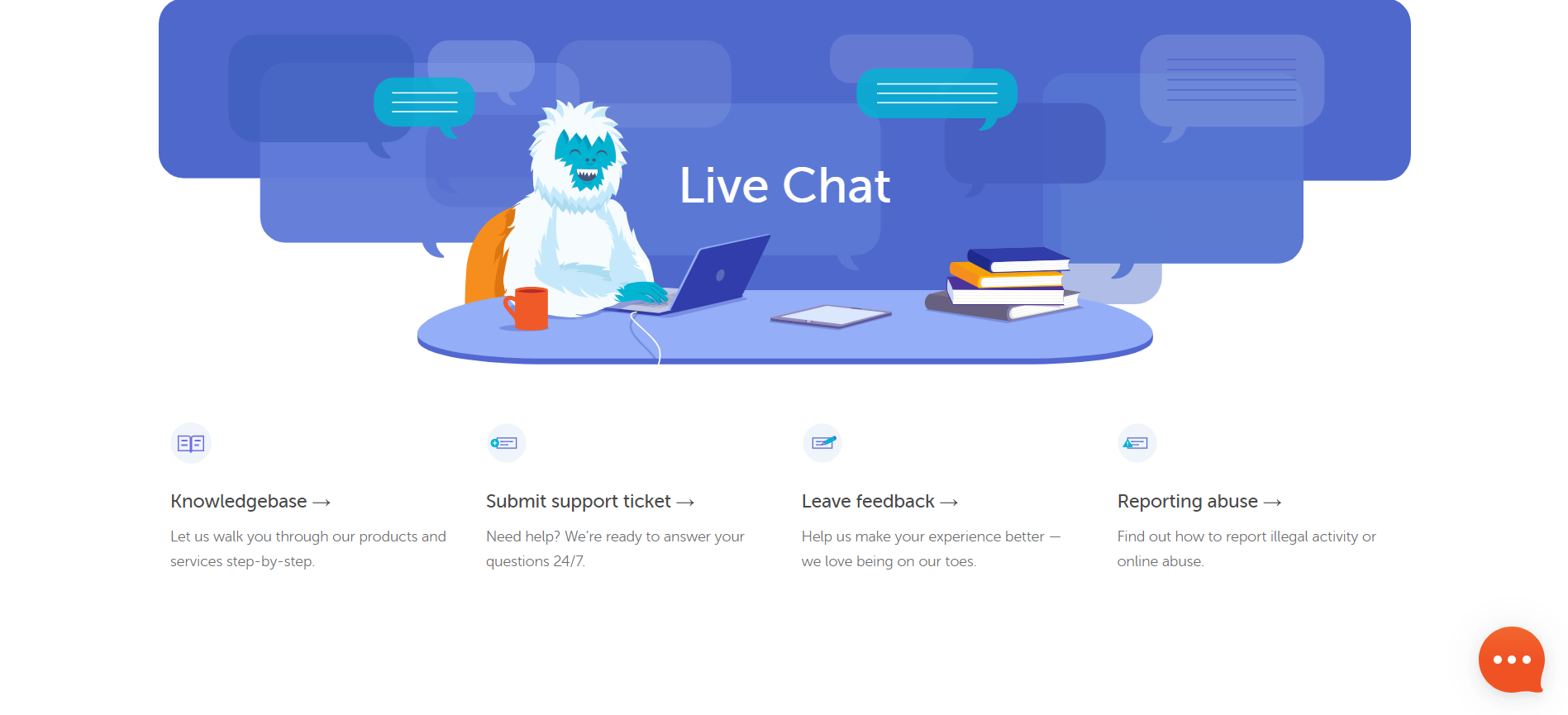
Namecheap and Hawk Host both provide strong customer support, but they cater to their users in slightly different ways. Namecheap offers 24/7 live chat and ticketing systems, detailed knowledge bases, and various educational resources like guru guides, blogs, and how-to videos. Additionally, Namecheap offers free website migration and instant setup, making it convenient for new users. However, Namecheap does not have phone support, which can be a drawback for those who prefer direct communication.
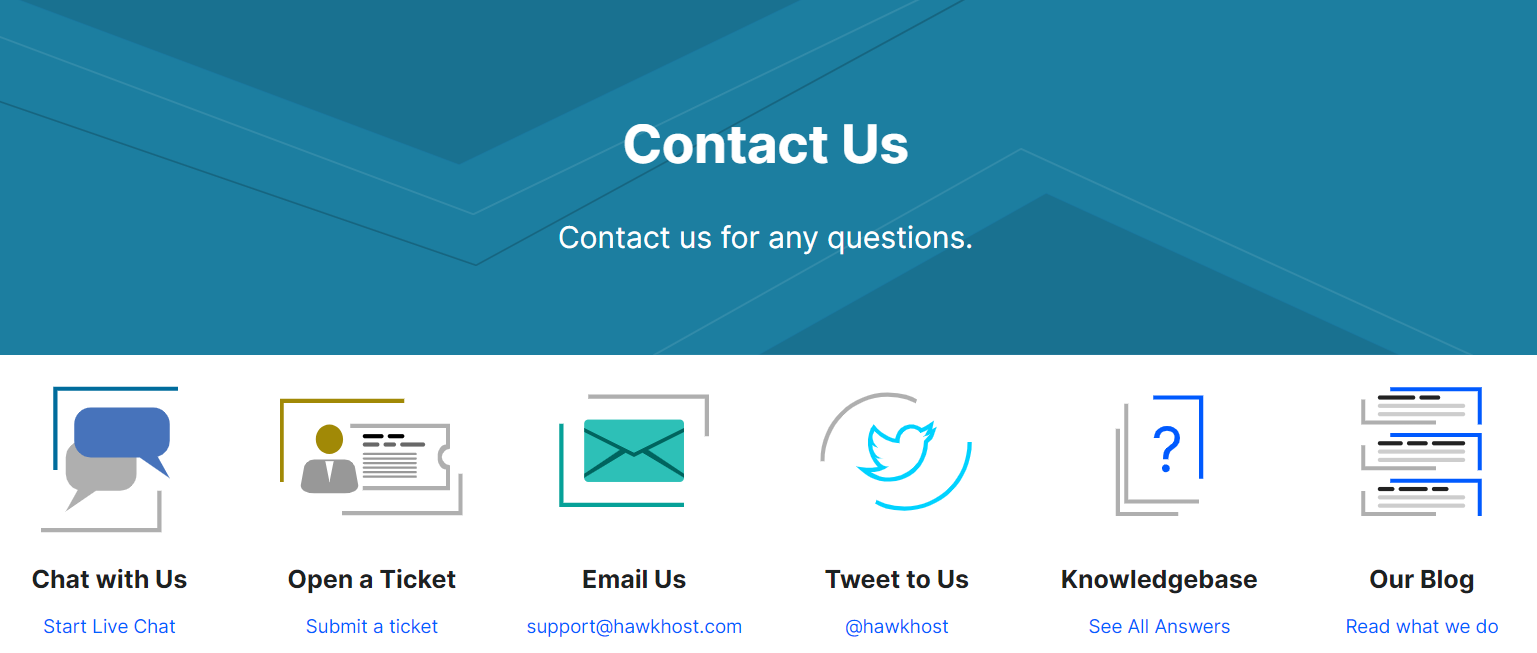
On the other hand, Hawk Host provides extensive support through multiple channels, including live chat, email, a ticket system, telephone, and even Twitter. They also offer a community forum for peer support, adding another layer of assistance. Their free migration support and 30-day money-back guarantee ensure users can easily switch and try their service without risk. Even though Hawk Host has fewer knowledge base articles compared to Namecheap, their multi-channel and community-centric approach makes them more versatile.
Namecheap vs Hawk Host: User feedback
Namecheap is widely appreciated for its affordability, reliability, and high-quality customer support. Users commend the availability of free SSL certificates, user-friendly cPanel, and outstanding hosting speed. However, shared hosting speed and the occasional slow response from support are noted concerns. Despite these minor drawbacks, Namecheap remains a popular choice for beginners and small to medium businesses due to its competitive pricing and satisfactory service quality.
Customers find the hosting provider highly reliable and stress-free to work with, especially when transferring domains and setting up hosting. The support team is consistently praised for being helpful and efficient. While the hosting packages may cost a bit more, users believe the quality of support and services justifies the investment in the long run.
Namecheap vs Hawk Host: FAQ
Which platform is better suited for hosting WordPress websites?
Both Namecheap and Hawk Host are well-suited for hosting WordPress websites, offering optimized plans with free SSL certificates and backup options. They provide features ensuring smooth WordPress integration and management. Therefore, both platforms are effectively tied in this category, making either a viable option for WordPress hosting.
Which hosting service offers better security features?
Both Namecheap and Hawk Host offer robust security features, but Namecheap stands out with its comprehensive SSL options, including Domain Validation, Organization Validation, and Extended Validation. Namecheap also supports jailed SSH access and provides additional security tools like eAccelerator and xCache. Hawk Host, while offering daily malware scans and Cloudflare integration, does not specify such a broad range of SSL certificates.
What are the major differences in pricing and value between Namecheap and Hawk Host?
Namecheap’s shared hosting plans range from $1.98 to $4.98 per month annually, featuring free SSL and Supersonic CDN, while Hawk Host’s shared hosting starts at $2.24 per month with unlimited bandwidth and proactive malware scanning. For WordPress hosting, Namecheap ranges from $2.91 to $5.74 per month, and Hawk Host starts at $2.24 per month including free Redis and Memcached servers. Each provider’s unique features cater to different user needs, with Namecheap being cost-effective for startups and Hawk Host offering advanced performance features.
Which platform offers better customer support?
Both Namecheap and Hawk Host provide robust customer support, but they specialize in different areas. Namecheap offers 24/7 live chat, ticket support, and a comprehensive knowledge base, while Hawk Host also includes phone support and a community forum. Hawk Host’s multi-channel and community-centric approach makes them more versatile, offering extended support options.
Which hosting service offers more scalability options for growing websites?
Hawk Host provides flexible cloud compute starting at $5.00 per month with seamless scaling options and high-performance infrastructure, making scaling easier. Namecheap, while offering various VPS and reseller plans, requires manual upgrades to higher plans. Hawk Host’s approach simplifies scaling, with dedicated servers and extensive resources available to meet growing demands.
How do the providers handle email hosting and what features are included?
Namecheap offers domain-based email accounts starting from 30 mailboxes and increasing to unlimited in higher plans, with features like spam protection and email forwarding. Hawk Host provides unlimited email accounts across all plans with enterprise-level spam filtering. Both hosting services offer robust email hosting, but Hawk Host focuses more on managing spam with higher-level filtration.
The making of this blog
We followed a clear, step-by-step process to write and research this article.









